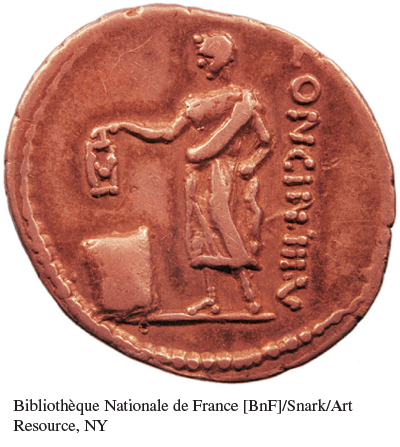The Late Republic
FOCUS QUESTION What led to the fall of the Roman Republic?

Coin Showing a Voter This coin from 63 B.C.E. shows a citizen wearing a toga dropping a voting tablet into a voting urn, the Roman equivalent of today’s ballot box. The tablet has a V on it, meaning a yes vote, and the coin has an inscription giving the name of the moneyer, the official who controlled the production of coins and decided what would be shown on them. Here the moneyer, Lucius Cassius Longinus, depicted a vote held fifty years earlier regarding whether an ancestor of his should be named prosecutor in a trial charging three vestal virgins with unchastity. As was common among moneyers, Longinus chose this image as a means to advance his political career, in this case by suggesting his family’s long history of public office.
(Bibliothèque Nationale de France [BnF]/Snark/Art Resource, NY)
The wars of conquest created serious problems for the Romans. The republican constitution had suited the needs of a simple city-state but was inadequate to meet the requirements of Rome’s new position in international affairs. New armies had to be provided for defense, and systems of administration and tax collection had to be created to support the republic. Moreover, the people of the Roman Republic came away from the war with differing needs and expectations. Roman generals, who had commanded huge numbers of troops for long periods of time, acquired great power and ambition and were becoming too mighty for the state to control. At the same time, non-Roman inhabitants of Italy who had fought in the wars of expansion began to agitate for full Roman citizenship, including the right to vote. Some individuals, including military contractors, profited greatly from the foreign wars, while average soldiers gained little.
These problems, complex and explosive, largely account for the turmoil of the late republic (133–27 B.C.E.). This era produced some of Rome’s most famous figures: the Gracchi brothers, Marius, Sulla, Cicero, Crassus, Pompey, and Julius Caesar, among others.
